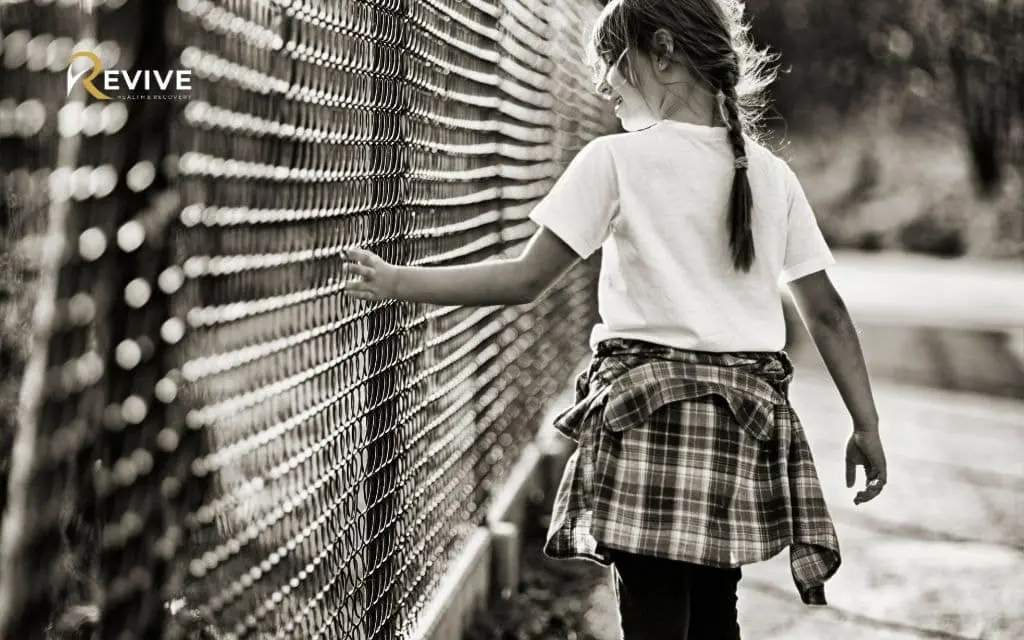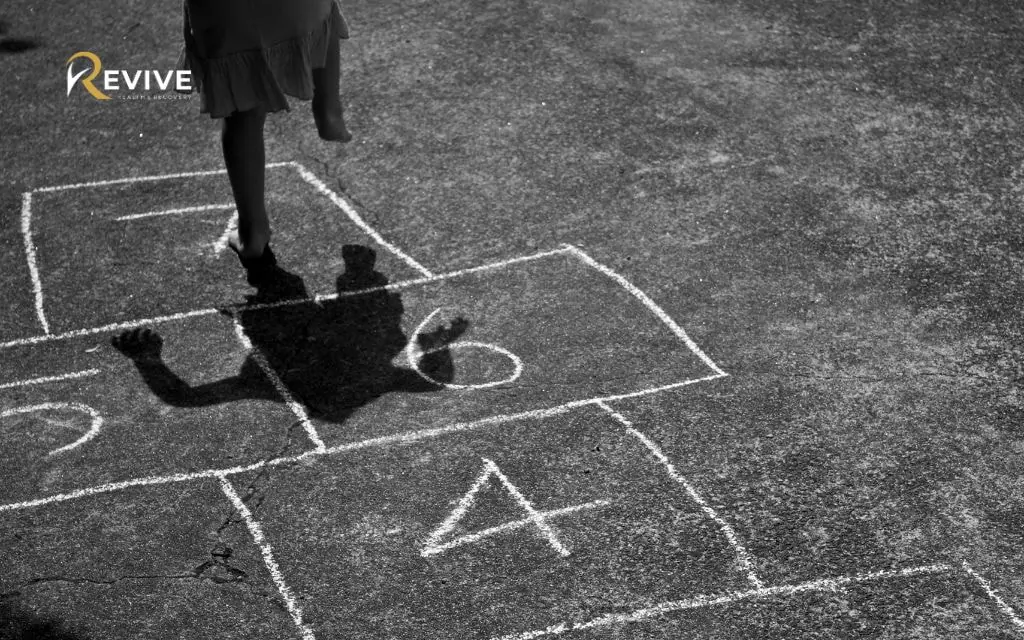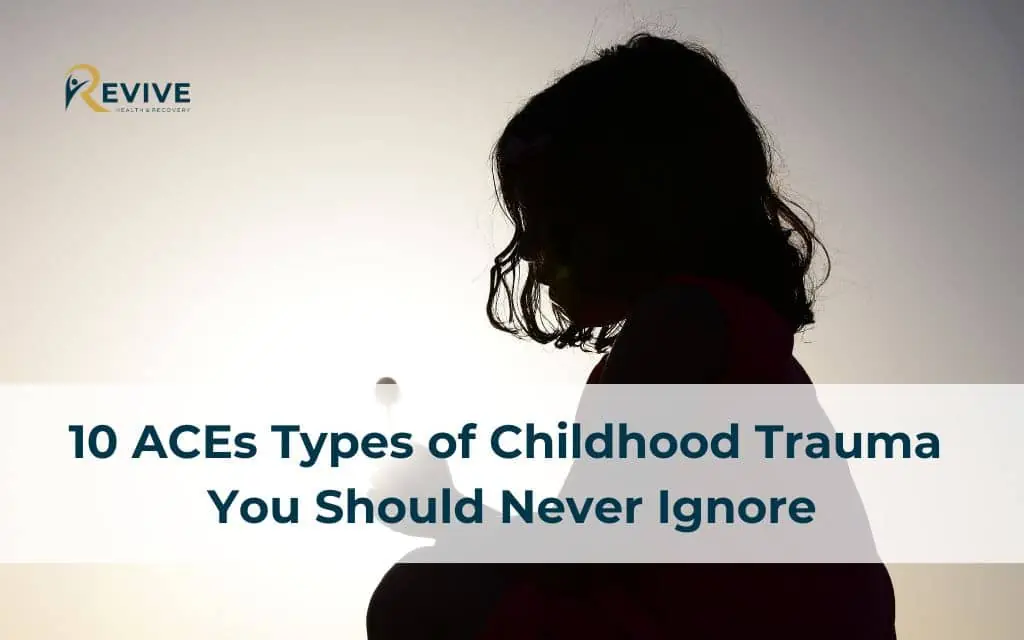Childhood experiences shape our development and influence our mental health throughout life. For many Denver residents, understanding the impact of early trauma creates a pathway to healing. At Revive Health Recovery, we recognize the critical connection between Adverse Childhood Experiences (ACEs) and current mental health challenges. Let’s explore 10 ACEs Types of Childhood Trauma that we should never ignore in this blog for emotional wound care.
What Are Adverse Childhood Experiences (ACEs)?
Adverse Childhood Experiences, or ACEs Types of Childhood Trauma, refer to potentially traumatic events occurring before age 18, which are part of a broader spectrum of various types of trauma. First identified in the groundbreaking CDC-Kaiser Permanente study in the late 1990s, these experiences include various forms of abuse, neglect, and household dysfunction.
The research revealed a disturbing truth: approximately 64% of American adults report experiencing at least one ACE, with 17.3% reporting four or more. These statistics remain consistent across Colorado and Denver communities, though urban environments often present unique risk factors.
How to Interpret Your ACEs Score
The ACEs score interpretation ranges from 0-10, with each type of trauma counting as one point. Research shows that higher scores correlate with increased risk for mental health disorders, substance use problems, and chronic physical conditions later in life.
This scoring system serves as a tool for understanding risk, not as a definitive predictor of outcomes. Many individuals with high ACEs scores lead healthy, fulfilling lives – especially when they receive appropriate support and intervention.

The 10 Types of ACEs and Their Categories
Adverse Childhood Experiences (ACEs) represent specific traumatic events that occur before age 18 and can have lasting effects on mental and physical health. At Revive Health Recovery, we recognize these experiences as foundational to understanding many adult challenges our clients face. The original ACEs study categorized these experiences into three domains, each containing specific types of trauma that impact development in unique ways. Below are 10 ACEs Types of Childhood Trauma.
Abuse Category
1. Physical Abuse
Physical abuse involves intentional use of physical force against a child that results in – or has the potential to result in – physical injury.
- What it includes: Hitting with a hand, belt, or other object; punching; kicking; shaking; burning; pushing; shoving; grabbing; or any other action that leaves marks, bruises, cuts, welts, or other physical injuries.
- Recognition signs: Unexplained injuries, fear of adults, flinching at sudden movements, wearing inappropriate clothing to cover injuries (like long sleeves in summer), or reporting physical harm.
- Long-term effects: Heightened stress response, difficulty with emotional regulation, increased risk of violent behavior, substance use disorders, and physical health problems including chronic pain conditions.
2. Emotional Abuse
Emotional abuse represents a pattern of behavior that impairs a child’s emotional development or sense of self-worth.
- What it includes: Constant criticism, threatening, rejecting, isolating, humiliating, shaming, name-calling, yelling, or withholding love and support.
- Recognition signs: Low self-esteem, extreme behavior seeking approval or attention, delayed emotional development, or depression.
- Long-term effects: Difficulty forming healthy relationships, chronic self-criticism, perfectionism, heightened sensitivity to rejection, depression, anxiety disorders, and increased vulnerability to future abusive relationships.
3. Sexual Abuse
Sexual abuse encompasses any completed or attempted sexual act, sexual contact, or non-contact sexual interaction with a child by a caregiver or other adult.
- What it includes: Fondling, penetration, exposure to sexual content, voyeurism, or exploitation through prostitution or pornography production.
- Recognition signs: Sexual knowledge inappropriate for age, sexual behavior with toys or others, physical symptoms in genital areas, fear of specific people or places, or regressive behaviors.
- Long-term effects: Trust issues, sexual dysfunction, boundary confusion, post-traumatic stress disorder, dissociative disorders, and higher risk of revictimization.
Neglect Category
4. Physical Neglect
Physical neglect involves the failure to provide for a child’s basic physical needs.
- What it includes: Inadequate food, clothing, shelter, hygiene, supervision, or access to healthcare.
- Recognition signs: Poor hygiene, inappropriate clothing for weather, constant hunger, untreated medical issues, frequent absences from school, or taking on adult responsibilities.
- Long-term effects: Chronic health problems, attachment disorders, difficulty trusting others to meet needs, hoarding behaviors, and poor self-care skills.
5. Emotional Neglect
Emotional neglect refers to the failure to respond to a child’s emotional needs, provide nurturing, or protect them from psychological harm.
- What it includes: Ignoring, rejecting, or isolating the child; failing to express affection; exposing the child to extreme spousal abuse; or allowing the child to use drugs or alcohol.
- Recognition signs: Often invisible and under-recognized; may present as withdrawal, seeking affection from strangers, or lack of attachment behaviors.
- Long-term effects: Difficulty identifying and expressing emotions, feeling “empty” or “numb,” poor self-awareness, chronic feelings of shame, and challenges forming intimate relationships.

Household Dysfunction Category
6. Mental Illness in the Household
This ACE involves living with a household member experiencing serious mental health challenges.
- What it includes: Exposure to suicidal behavior, severe depression, psychosis, bipolar disorder, or other conditions that significantly impact functioning.
- Recognition signs: Taking on caretaking roles, anxiety about the parent’s wellbeing, unpredictable home environment, or social isolation due to stigma.
- Long-term effects: Hypervigilance to others’ emotional states, codependent relationship patterns, anxiety disorders, and increased risk of developing similar mental health conditions.
7. Incarcerated Relative
This ACE involves having a household member sent to prison or jail during childhood.
- What it includes: Experiencing the arrest process, visiting a parent in prison, stigma from community members, or disruption of family structure.
- Recognition signs: Secretiveness about family, shame, financial hardship, or behavioral problems related to loss and grief.
- Long-term effects: Trust issues with authority figures, difficulties with the justice system, economic instability, and increased risk for involvement in criminal activity.
8. Substance Abuse in the Household
This ACE involves living with someone who misuses alcohol or drugs.
- What it includes: Exposure to intoxicated behavior, neglect due to substance use, financial instability, or exposure to illegal activities.
- Recognition signs: Taking on adult responsibilities, inconsistent parenting experiences, fear or anxiety about parent’s behavior, or protecting siblings from the impaired adult.
- Long-term effects: Increased risk of substance use disorders, difficulty establishing healthy boundaries, codependency patterns, and heightened vigilance in relationships.
9. Domestic Violence
This ACE involves witnessing violence between adults in the home, particularly against the mother or stepmother.
- What it includes: Seeing physical assaults, hearing threats or violent arguments, observing injuries, or experiencing the aftermath of violent incidents.
- Recognition signs: Aggressive behavior, extreme withdrawal, anxiety when adults argue, attempts to intervene in conflicts, or physical complaints like headaches and stomachaches.
- Long-term effects: Normalization of violence in relationships, perpetuation of violence cycles, chronic anxiety, difficulty resolving conflict, and increased risk of entering abusive relationships.
10. Parental Separation or Divorce
This ACE involves the separation of parents or primary caregivers through divorce, abandonment, or other circumstances.
- What it includes: Custody battles, moving between households, loyalty conflicts, financial instability, or introduction of new partners/step-families.
- Recognition signs: Behavioral regression, acting out, anxiety about abandonment, or taking sides between parents.
- Long-term effects: Attachment issues, fear of commitment, relationship insecurity, difficulty trusting long-term relationships, or choosing unstable partners.
ACEs in the Denver Context
In Denver, Colorado, these experiences often intersect with urban challenges:
- Housing instability and gentrification forcing multiple family moves
- Community violence exposure in certain neighborhoods
- Economic pressures creating parental stress and absence
- Cultural barriers to accessing mental health services
- Resource disparities between Denver neighborhoods
The ACEs Score and Cumulative Impact
Each ACE contributes one point to an individual’s ACEs score, ranging from 0-10. Research consistently shows that higher ACEs scores correlate with increased health risks:
- ACEs score of 4+: 4-12x increased risk of alcoholism, drug abuse, depression, and suicide attempts
- ACEs score of 6+: 20-year reduction in life expectancy
At Revive Health Recovery in Denver, we understand that ACEs rarely occur in isolation. Most individuals with one ACE have experienced multiple types, creating complex trauma patterns that require integrated treatment approaches. Our trauma-informed care model addresses these layered experiences with evidence-based strategies tailored to each individual’s unique trauma history.
For help addressing the impact of childhood trauma, contact our Denver location at (303) 268-4655. Our team specializes in ACEs-informed recovery services that create pathways to healing and resilience.
How ACEs Impact Mental Health
The connection between ACEs and mental health conditions is profound. ACEs and mental health research demonstrates that childhood trauma physically alters brain development and stress response systems.
Exposure to multiple ACEs increases the likelihood of developing:
- Depression and anxiety disorders
- Post-traumatic stress disorder (PTSD)
- Substance use disorders
- Self-destructive behaviors
- Relationship difficulties
- Chronic physical health conditions
These effects occur through toxic stress – prolonged activation of stress response systems that disrupts normal brain development, contributing to the lifelong impact of childhood trauma. For children, this constant stress state can become their baseline, fundamentally changing how they perceive and respond to the world around them. These changes affect normal brain development in profound ways.
ACEs in Denver: Local Mental Health Insights
Denver presents unique challenges and opportunities regarding childhood trauma and mental health. Colorado Department of Public Health data indicates that Denver County residents report slightly higher rates of adverse childhood experiences compared to state averages.
Urban stressors in Denver’s changing neighborhoods contribute to these numbers, including:
- Housing insecurity and displacement
- Economic disparities between communities
- Access barriers to consistent mental health services
- Educational system pressures
- Community violence exposure

Denver-Specific Trauma Factors for Childhood Trauma
Denver’s rapid growth creates particular challenges for families, exacerbating factors contributing to childhood trauma. Children in certain neighborhoods face increased exposure to:
- Community violence
- Housing instability
- Food insecurity
- Transportation barriers
- School system transitions
These environmental stressors compound the effects of household-based ACEs, creating complex trauma pictures for many Denver children and families.
Recovering from Childhood Trauma in Denver and Colorado
Healing from ACEs requires a trauma-informed approach—one that recognizes the widespread impact of trauma, understands potential paths for recovery, and integrates knowledge about trauma into policies and practices.
Top Therapy Options for ACEs
Several evidence-based therapeutic approaches effectively address childhood trauma:
- Cognitive Behavioral Therapy (CBT) helps individuals identify and change negative thought patterns resulting from trauma experiences.
- Eye Movement Desensitization and Reprocessing (EMDR) helps process traumatic memories through bilateral stimulation while recalling distressing events.
- Trauma-Focused Cognitive Behavioral Therapy (TF-CBT) combines trauma-sensitive interventions with CBT, specifically designed for children and adolescents.
- Mindfulness-Based Approaches teach present-moment awareness and acceptance techniques to manage trauma-related symptoms.
Each approach offers different benefits, and treatment plans should be customized to individual needs and experiences.
Finding Trauma-Informed Care in Denver
Denver offers several resources for trauma recovery:
- The Denver Child Advocacy Center provides specialized services for children affected by abuse
- Colorado Child Trauma Network coordinates services statewide
- Community mental health centers offer sliding-scale services
- Revive Health Recovery provides comprehensive trauma treatment programs
Why Revive Health Recovery Stands Out
Revive Health Recovery delivers exceptional trauma-informed care through:
- Comprehensive assessment processes that identify and address the full spectrum of ACEs, paired with specialized trauma therapies like CPT.
- Personalized treatment plans integrating evidence-based practices
- Dual-focus programs addressing both trauma and co-occurring substance use
- Family involvement when appropriate for healing generational trauma patterns
- Staff with specialized training in trauma-informed approaches
Our approach recognizes that healing happens in relationships and safe environments, not just through clinical interventions.
FAQs About Aces Types Of Childhood Trauma
What are the 10 types of ACEs?
The 10 types include physical abuse, emotional abuse, sexual abuse, physical neglect, emotional neglect, mental illness in the household, incarcerated relative, substance abuse, domestic violence, and parental separation/divorce. Revive Health Recovery addresses all these trauma types with specialized, integrated care.
How do ACEs affect mental health in adulthood?
ACEs increase risk for depression, anxiety, PTSD, substance use disorders, and relationship difficulties in adulthood. At Revive Health Recovery, we help clients understand these connections and develop effective healing strategies.
What does my ACEs score mean?
Your ACEs score indicates potential risk factors but doesn’t determine your future. Higher scores correlate with increased health risks, but healing is always possible. Revive Health Recovery provides personalized assessment and treatment regardless of your score.
Where can I find trauma support in Denver?
Revive Health Recovery offers comprehensive trauma services in Denver. Our program provides the most integrated approach to trauma healing in the region, combining evidence-based therapies with holistic support.
Can therapy heal childhood trauma?
Yes, appropriate therapy can significantly heal childhood trauma effects. Revive Health Recovery’s trauma-informed approach has helped hundreds of Denver residents transform their relationship with past trauma and build healthier lives.
Conclusion
Understanding childhood trauma categories is the first step toward healing. While ACEs affect nearly two-thirds of adults, their effects aren’t permanent. Modern neuroscience confirms the brain can create new healing pathways throughout life.
At Revive Health Recovery, we see transformation daily as Denver residents work through their ACEs and build resilience. Our Colorado trauma-informed approach acknowledges both the neurobiological impacts and the human capacity for recovery.
Childhood trauma may have shaped your past, but it need not define your future. Through evidence-based therapies and personalized treatment, the cycle can be broken – for you and future generations.
Take that first step today. Contact Revive Health Recovery at (303) 268-4655 or visit our Denver trauma therapy center to transform your journey from trauma to resilience.



